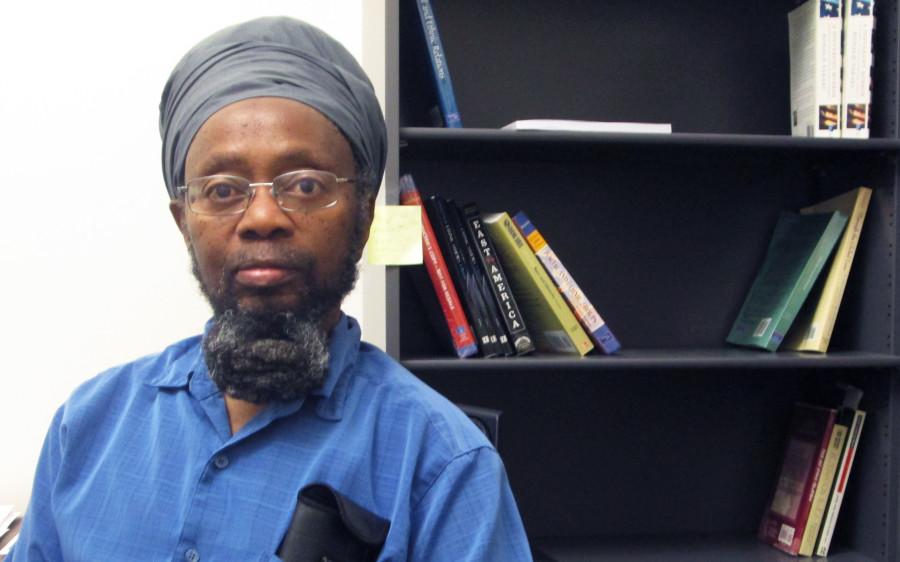Liberal arts professor pursues passion for history: Dr. Anthony Merritt tells students to find ‘good, honest work’
April 9, 2015
A career rooted in one’s passion is one of the most rewarding things achievable in life. CSUSM professor Dr. Anthony Merritt exemplifies this philosophy.
Dr. Merritt did not start the journey in higher education until after his military service. He began by taking classes at Mesa College and majored in Sociology and minored in Black Studies. Merritt maintained his academic interests after transferring to San Diego State University (SDSU) where he earned his bachelor’s degree in Sociology.
After graduating from San Diego State, Dr. Merritt decided to further explore his interest in history. He received his graduate degree in history at UCSD. Using the knowledge he had developed through his classes, Merritt taught at several community colleges and universities in San Diego.
Deciding to take his education a step further, Professor Merritt enrolled in classes at Union University, a hybrid style institution aimed at working individuals. There he received his doctorate degree in History.
When asked when he felt inspired to become an educator, Dr. Merritt responded with the following.
“That became part of the studies at Mesa. I was very much encouraged by the department chair of Black Studies at that time. She kind of thrust me into being group leader and discussion leader… I got the bug,” he said.
Education Meets Personal Life
Like many students, Merritt was unsure of what he wanted to study early on. His current research interests are history and culture of Ethiopia, Caribbean culture and history and Rastafarian ideology and social issues. Dr. Merritt said that these focuses had been a part of his personal life since he started his schooling, but he didn’t initially decide to pursue them academically.
“I didn’t think about it in terms of education so much as that was a personal spiritual expression, but it certainly flourished at that time,” Merritt said. “Ethiopia grew out of my personal interest as a Rastafari, as a way of life.”
Dr. Merritt discussed how he felt moved towards the Rasta lifestyle.
“I was raised Baptist and moved through that. Beginning to move and explore and look at various other faiths/expressions and have a lot of respect for all faiths and spiritual expressions,” he said. “I think one of the things that maybe people who practice Rastafari would say, among other things, is that whatever they have been looking for in other pathways… what was missing was a cultural expression. And that’s what the basis of Rastafari is, African culture. A king of retooling or re-emergence of it.”
Dr. Merritt’s academic work and personal life as a Rastafari continued to mesh during his doctoral research. He explained how his focus was on the town of Shashamane, Ethiopia.
“I’ve worked with the school project over a number of years, [and] helped with water pumps being put up. That’s one of the big problems that people have had, potable water. That’s an African wide issue,” Merritt said.
Race, Education and Student Advice
Shifting gears to the topic of race relations in the U.S., Merritt explained the topic from his point of view.
“I think old school racism is pretty much a thing of the past. Even though there are some hotbeds of it here and there. And not just against blacks, but against Asians, Latinos [and] against LGBT. That’s just part of the human expression. And therefore I think I see it more as systematic,” he said. “I talk about racism as institutionalized racism rather than this ‘I don’t like you because of the way you look.”
After being asked what changes he would like to see nationally, he mentioned higher employment and a cheaper college education.
“I’ve always felt that college education should be as free as possible. When I look at what you all as students are dealing with, your escalating fees whether it’s here at CSU San Marcos or worse in the UC system. I teach at community colleges, their fees are going up… Let education be more truly universal so that young people can compete in this global market,” Merritt said.
Dr. Merritt’s final advice to students navigating through college is applicable to all students regardless of major.
“Don’t forget your heart, but don’t have it on your sleeve. Meaning, do what you want to do including making money, but do it with a sense of moral responsibility in whatever way, shape, or form you can to help other people. It makes no difference what it is as long as it’s good honest work that can help other people,” he said.


